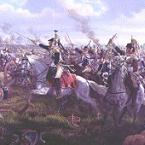Reiryc
Posts: 4991
Joined: 1/5/2001
Status: offline

|
quote:
Its not that the British land and march on an undefended paris. Its that a Corps of British can land in Brest in 1805, defeat 30, 000 Frenchmen waiting for them there and then march directly on Paris with no thought to requiring a seaport.... consistently.
Doesn't brest have a port in this game? I'm pretty certain it does and therefore this requirement is fulfilled, no?
However, the concept of supplies is an abstraction in this game. The game wasn't created with a serious treatment on supplies and supply routes. What does try to do is require that atleast some interest be paid to lines of communication but not in a detailed manner. I think it accomplishes this result.
quote:
If the solution to the fight against Austria sees hundreds of thousands of troops on both armies fighting decisive battles in Switzerland and the Tyrol, there is something fundamentally flawed with the design.
I guess we disagree here. My view is that these 'provinces' in the game represent very large tracts of land that include the flatter valleys and approaches to the mountains. I could see the switzerland province being an issue, but not so much that special code needed to be written for that province. Again, this is a matter of what constitutes acceptable abstraction for game purposes.
quote:
. Napoleonic campaigns tended toward the lowlands for many reasons and this game doesn't reflect that.
Was it designed to reflect that? Is it needed to reflect that given what the game is trying to portray? I would argue that it is beyond the scope and not necessary.
We can quibble over numerous rules in EiA, CoG, etc etc over whether or not they produce historical results and what we will come to learn at the end of such discussions is, that one person prefers this kind of historical abstraction and another person prefers another.
quote:
Also, if the way to defeat an enemy force in France is to order all of my National Guard units to leave their fortresses and wait in the open while the main army fought an indecisive engagement, why was this tactic never adopted?
I think you phrase the question incorrectly to produce your desired view. I would argue that what happens is that reinforcements are rushed to the front in an attempt to hit the rear of an army and cause disruption to his lines of communication and morale. Causing in the end his surrender.
Due to the game having large provinces, this is an abstraction. Did the battle happen along the 'border' of 2 provinces where this would work or did it happen in the middle of said province and thus wouldn't be likely? In this game we deal with the abstraction of quite large provinces.
As far as why wasn't it done historically? Probably because we are dealing with game counters, computerized sprites representing men, an artificial opponent and so on. Many will do a-historical moves with games because they aren't dealing with real human beings. I've taken low strength corps that had no business attempting a stand up fight against some of my opponents in eia due to their strength but still went forward with it anyways. Why? Because they weren't real men. There wasn't a real inhibitor such as dealing with men's lives.
quote:
As well, surrounding armies was simply not viable at the scale this game suggests. I should not need to order my Flanders garrison units into the field to cut off units fighting a few miles west of Paris. Even the entire Ulm encirclement campaign would, at this scale, exist entirely in the space of a single province. Army destruction has to be the rsult of local tactics rather than grand strategic.
This is an example of they type of discussion that produces the acceptable abstraction needed to reflect what happened historically.
quote:
EDIT: It should be noted that I am not saying this to bash CoG. I'm discussing it in the context of what may be the difference between EiA and CoG. EiA, as a boardgame, enforced fairly realistic results in my opinion.
It did cause some fairly realistic results to be sure. But believe me, I had things done to myself and did to others quite a few ahistorical situations in the game against my opponents where there were cries of 'that would never have happened! That's so un-historical!!' I still remember one guy arguing that there should have been loss rates on the march due to drop out from dysentry. While undoubtedly this did happen, is it really necessary that this must be included in eia? I would argue no, that this abstraction didn't need to be included and that even without it, the game still wasn't 'ahistorical' because they weren't included directly.
In the end, my point of view is that some people get so bogged down in certain details that they miss the forrest through the trees.
_____________________________
|
 Printable Version
Printable Version






 Give an uninvolved person the manual and the game and let them give it a go.
Give an uninvolved person the manual and the game and let them give it a go.





 Yes, I'm a wargamer but no, I'm not an elitest.
Yes, I'm a wargamer but no, I'm not an elitest. 




 and missed seeing it.
and missed seeing it. 

 New Messages
New Messages No New Messages
No New Messages Hot Topic w/ New Messages
Hot Topic w/ New Messages Hot Topic w/o New Messages
Hot Topic w/o New Messages Locked w/ New Messages
Locked w/ New Messages Locked w/o New Messages
Locked w/o New Messages Post New Thread
Post New Thread